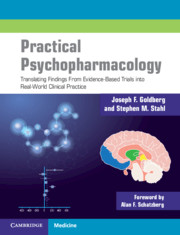 Practical Psychopharmacology
Practical Psychopharmacology from Part II - Targets of Pharmacotherapy
Published online by Cambridge University Press: 19 October 2021
In this chapter we will focus on dimensional constructs of impulsive versus compulsive behaviors and their interface with aggression in relation to pharmacotherapy. Like so many other psychopathological states, impulsivity and compulsivity are not pathognomonic of any particular categorical diagnostic entity and may fit within the broader constellation of numerous conditions that affect mood, development, personality, addiction, cognition, and perception. Particular issues arise when considering trait versus state features of psychopathology and environmental factors that may exacerbate or otherwise contribute to an underlying diathesis.
We will begin with some definitions, followed by a quick review of pertinent neural circuitry that bears on relevant psychopathology and psychopharmacology (Box 14.1).
To save this book to your Kindle, first ensure [email protected] is added to your Approved Personal Document E-mail List under your Personal Document Settings on the Manage Your Content and Devices page of your Amazon account. Then enter the ‘name’ part of your Kindle email address below. Find out more about saving to your Kindle.
Note you can select to save to either the @free.kindle.com or @kindle.com variations. ‘@free.kindle.com’ emails are free but can only be saved to your device when it is connected to wi-fi. ‘@kindle.com’ emails can be delivered even when you are not connected to wi-fi, but note that service fees apply.
Find out more about the Kindle Personal Document Service.
To save content items to your account, please confirm that you agree to abide by our usage policies. If this is the first time you use this feature, you will be asked to authorise Cambridge Core to connect with your account. Find out more about saving content to Dropbox.
To save content items to your account, please confirm that you agree to abide by our usage policies. If this is the first time you use this feature, you will be asked to authorise Cambridge Core to connect with your account. Find out more about saving content to Google Drive.